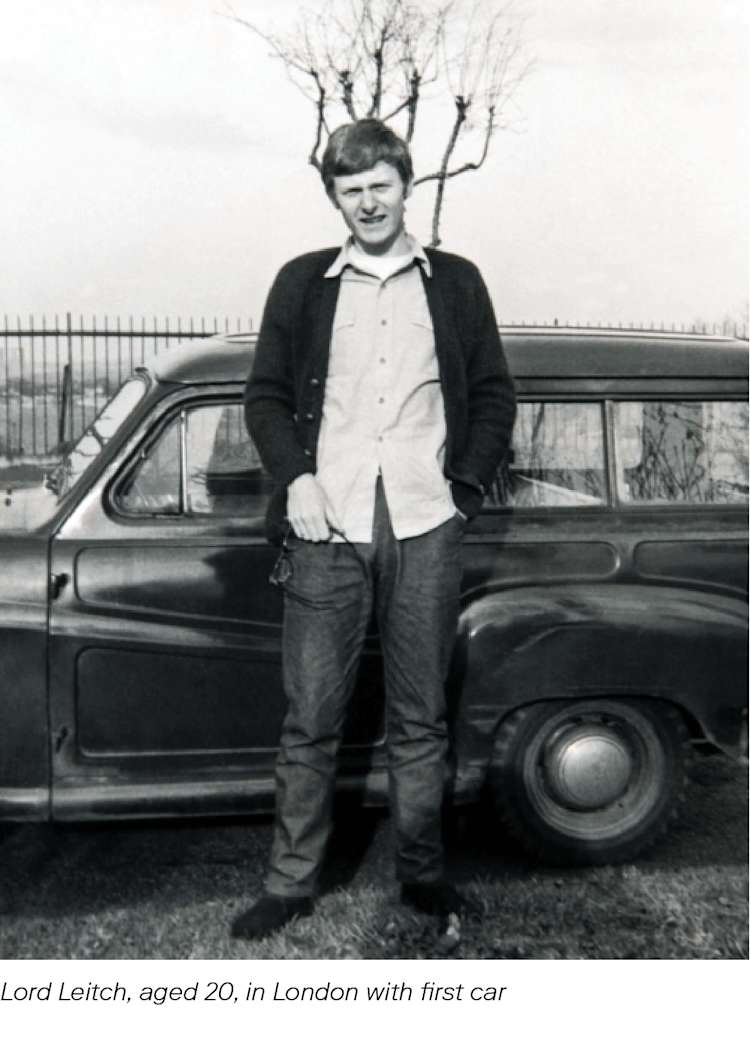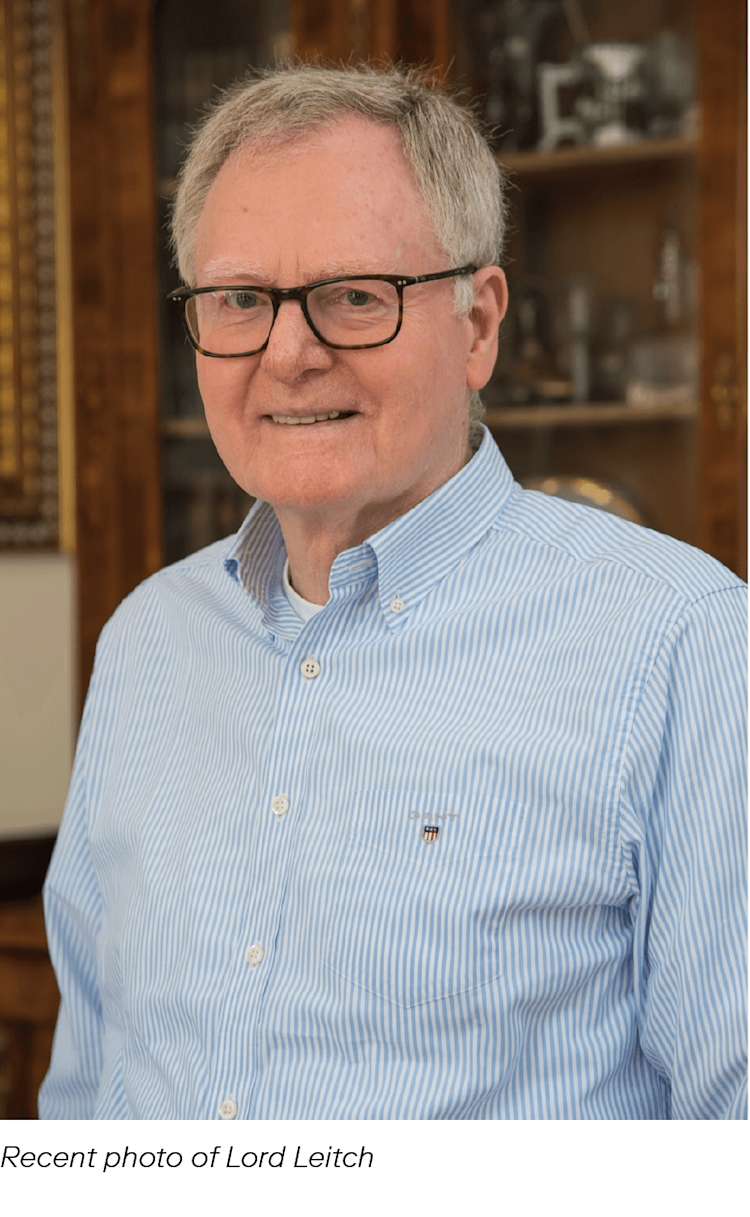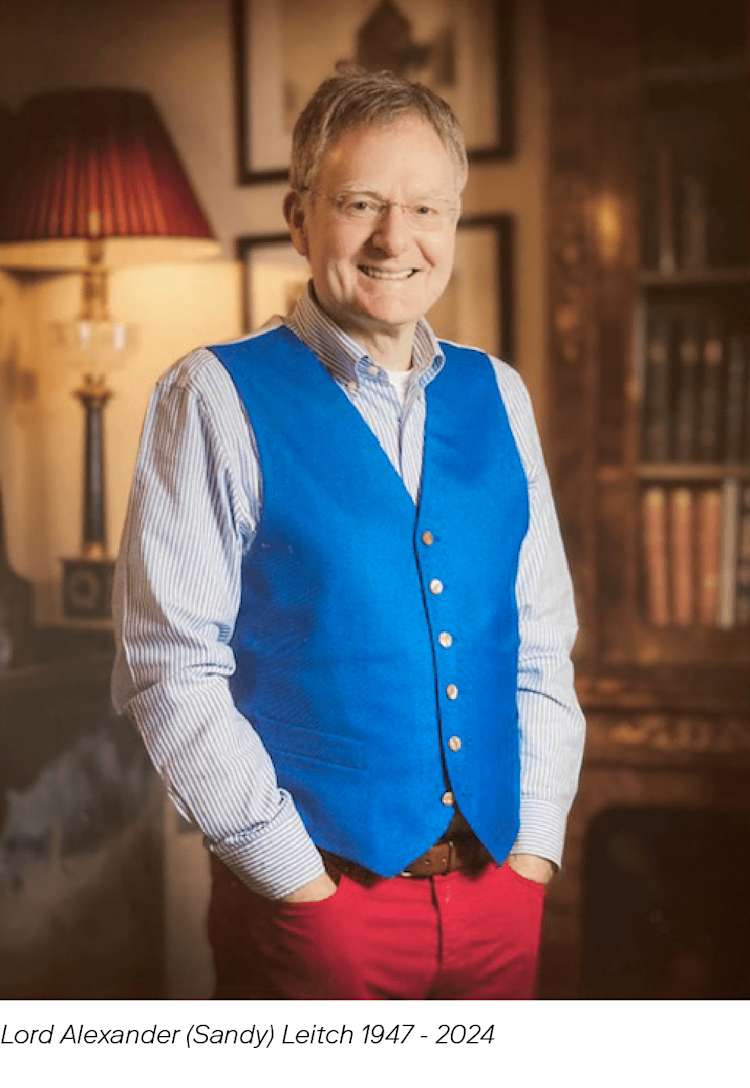Shortly after he was ennobled, Sandy Leitch was rung by a Scottish journalist and asked what title he had chosen. ‘The Lord Leitch of Oakley’, he replied. The journalist burst out laughing, saying that not many people dared to admit they came from a place like that, let alone include it in a title.
Leitch was quick to put the journalist in his place. Granted, he said, the Fife coal mining village where he grew up was rough, tough and bleak, but it was a place of huge character and he was immensely proud to have spent his most formative years there.
Leitch never wavered from this view, and credited Oakley’s rugged, no-nonsense ethos for much of his success in later life.
The youngest of four children, Alexander Park Leitch was born in Blairhall, West Fife in 1947 to Donald Leitch and his wife Nancy (née Park). He was 18 months old when his father, a miner, died from Addison’s Disease at the age of 35, forcing his mother to work gruelling hours as a cleaner to make ends meet.
Throughout his boyhood Leitch experienced economic hardship and struggle. Brought up in a council house, he had to share a cramped bedroom with his brother and an alcoholic uncle. He wore makeshift clothes, never received any birthday presents, and as a child went on only one holiday — to a Butlins camp in Ayr.
Often left to his own devices, he loved exploring the magnificent countryside around Oakley and sharing adventures with larger-than-life characters. He saw this as his ‘Tom Sawyer’ period, and built his own bicycle so that he could explore other parts of Scotland. He shone at school, regularly topping his class of 40 pupils, and excelled at sport, especially football, which he briefly considered taking up professionally. Looking back, he felt fortunate to have been rejected as an apprentice professional, because he knew deep down that he was not good enough.
His Scottish ‘Higher’ results more than qualified him for university, but the family’s precarious finances ruled out further education. Instead, at the age of 17, he went to London and in 1965 he became a £12-a-week computer programmer with National Mutual Life.
Thanks as much to luck as to judgement, his choice of career was inspired. Industrial scale computing was still in its infancy, but the era of Harold Wilson’s ‘white heat of technology’ had dawned, and the computer revolution was about to take off. Ones and zeroes became his stock-in-trade as he threw himself into the world of computers and systems design. He is credited with having written the first ever life assurance ‘search engine’ program when he was 19. At 23 he was made the company’s Chief Systems Designer.

From National Mutual he moved to the fledgling Hambro Life, where he was responsible for designing all the company’s computer systems. He had an insatiable hunger to succeed. Colleagues described him as the most driven individual they had ever met, ‘a man with his eyes on the hills and his feet on the ground.’
He remained in the insurance industry for much of his career, becoming chief executive of Allied Dunbar in 1993 and of Zurich Financial Services in 1998. He represented the industry as Chairman of the Association of British Insurers. He became a director of BAT Industries, deputy chairman of Lloyds TSB (where he played a pivotal role in tackling the financial crash of 2007), and chairman of Bupa, Scottish Widows, and Intrinsic Financial Services. From 2012 he chaired the wealth management platform FNZ, helping to steer it from lowly beginnings to become a world leader in financial technology with $1.5 trillion in assets under administration.

Leitch was a natural and enthusiastic leader who led by example. People liked working for him. He had a fervent sense of moral responsibility, believing that the strong and successful had a duty to put something back into society. He devoted much of his time to charity and public service.
As chairman of the National Employment Panel for eight years, he was tasked with finding ways to get more people into sustainable jobs. He also worked closely with the Prince of Wales on several projects with Business in the Community, and on initiatives such as employee volunteers. He was presented with the Prince of Wales Ambassador Award for charitable work in 2001.
On one occasion the Prince invited Leitch to lunch at his Gloucestershire residence, Highgrove. There were seven or eight other guests, and during the meal there was a discussion about the Second World War and Winston Churchill, after which the guests chatted among themselves. Leitch turned to the elderly lady sitting next to him and asked if she had ever met Churchill. ‘He was my Father’, replied Mary Soames curtly.
A staunch admirer of Tony Blair, he was made a life peer in 2004. Although he always sat on the Labour benches, his loyalty to the party was pushed to the limit during the Corbyn era. Leitch was ‘New Labour’, believing that the creation of wealth was vital to deliver social justice and opportunity for all.
In 2005 he was tasked by the then Chancellor, Gordon Brown, to lead a review into the UK’s long-term skills needs. The Leitch Review of Skills concluded that Britain faced ‘a lingering decline in competitiveness, diminishing economic growth and a bleaker future for all’ unless skills were improved. Its recommendations placed skills at the heart of economic policy, and were widely seen as a defining landmark in the development of skills policy. He worked well with the Chancellor, who saw and valued his contribution to society. Brown said of him subsequently: ‘Many people who have not had the privilege of knowing Sandy, and many people who may not even know his name, have led more fulfilled lives as a result of all he has done and achieved.’
A man of immense energy, Leitch had numerous hobbies and interests. He was a trustee of the Philharmonia Orchestra and of the National Gallery of Scotland. He had a passion for antique collecting and fine malt whisky, and enjoyed painting, sculpting, writing poetry and listening to music. In his latter years he wrote widely, penning his life story for friends and family, and compiling a lavishly illustrated anthology of his boyhood adventures for the amusement of his children and grandchildren. Although an agnostic, he was deeply spiritual and hosted seminars about religion. One of his most treasured memories was of being blessed by the Dalai Lama during a visit to India. He gained comfort through prayer during his final illness and found faith in his last weeks.
He was a Freeman of the City of London and had an honorary doctorate in business administration. He was chancellor of Carnegie College.
By his first wife, Valerie Hodson, Leitch had three daughters. The marriage ended in divorce in 1992. By his second wife, Noelle Kristin Dowd, whom he married in 2003, he had a daughter and two sons, the boys being born when he was in his seventies. With Texas-born Noelle, who was 22 years his junior, he found lasting happiness. He described her as his love, best friend and soul-mate. The couple had homes in London, Oxfordshire and New Jersey.
Leitch suffered from ill-health for much of his adult life, and nearly died at the age of 32 when he was found to be suffering from sarcoidosis, a rare illness which plays havoc with the immune system. He overcame numerous life-threatening illnesses with determination and good humour. He was diagnosed with leukaemia in 2024. Death, he believed, should not be an all-consuming fear, but neither must its shadow be ignored. He concurred with St Benedict, who wrote 1,500 years ago: ‘Keep death daily before your eyes’.
Through sheer willpower and hard work, Leitch rose to become one of Britain’s leading businessmen, a peer of the realm, a social and spiritual thinker, a patron of the arts and a supporter of countless charities. His life was dogged by tragedy, sorrow and ill-health. Against the odds, he overcame obstacles with integrity, modesty, kindness and self-deprecating humour. He never forgot his humble Oakley roots.
